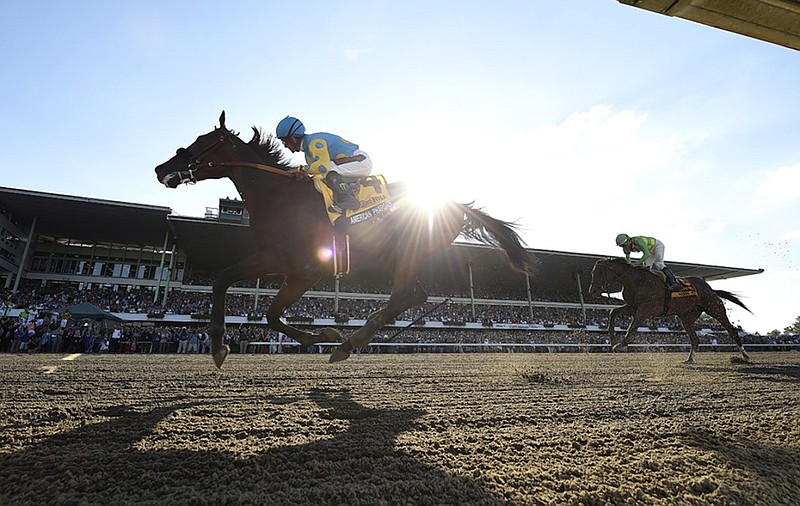Read more
Triple Crown winner American Pharoah wins Haskell in return
The Haskell Invitational done early Sunday evening, Triple Crown champion American Pharoah the expected yet stunningly impressive winner of the race, NBC's Tom Hammond proclaimed: "Wow. I don't know what else to say at this point."
Here's something that everyone who's ever cared enough about thoroughbred racing to watch so much as a single Kentucky Derby should say to American Pharoah's human team: Thank you. Thank you, thank you, thank you.
Nothing in sports is more fragile than the health of a thoroughbred race horse. You're talking about as much as 1,300 pounds of horse flesh coming down on a single leg that's not much thicker than the sweet spot on a baseball bat. It's a tragic accident waiting to happen each time these magnificent creatures break from a starting gate.
Certainly that risk has been there as long as there's been horse racing, which dates at least as far back as 648 BC in ancient Greece. Injuries, often fatal, are part of the game.
But what if you owned American Pharoah and your horse just became the first Triple Crown winner in 37 years? What if you have reportedly sold breeding rights for far north of $20 million? Yes, you still retain 100 percent of racing winnings, but the breeding rights dwarf that.
In fact, according to ESPN's Darren Rovell, American Pharoah should ultimately earn 28 times more money in the breeding shed than the $5.6 million he has won to date at the track.
How easy or wise would it be for any of us to keep our horse on the track, knowing one wrong step could end our pot of gold's life? Even if you'd taken out a sizable insurance policy, which owneer Ahmed Zayat reportedly has, could you keep racing American Pharoah?
For that matter, how would you feel if you were Coolmore Ashford Stud, the Kentucky breeding operation that has reportedly purchased Pharoah's breeding rights? Yes, each fresh victory ups the fee you can charge for a live foal - easily as much as $750,000 at the moment - but each new race could leave you with nothing.
Nevertheless - with literally tens of millions of dollars on the line each of the 200 or more times a race those 1,300 pounds of horse flesh come to rest on a single, spindly leg - that's just what Zayat and Hall of Fame trainer Bob Baffert have chosen to do (for at least a brief time longer) because, in Baffert's words: "Winning a Triple Crown is bringing so much enjoyment to the sport of racing. We're going to share him."
Their sport needs such generosity in a major way. American Pharoah's Triple Crown may have slowed the industry's steady and consistent decline over the past couple of decades - the crowd of 60,968 at New Jersey's historic Monmouth Park bested the track's previous attendance record by more than 7,000 - but it has far from stopped the bleeding.
Nor is one horse's grand career likely to change that. There's even a bit of a Catch-22 to this Triple Crown stuff. Given that 37 years passed between Affirmed winning all three Triple Crown races in 1978 - the Kentucky Derby, the Preakness Stakes and the Belmont Stakes - it's clearly difficult to do.
On the other hand, if some horse a year from now wins it, the public won't be near so likely to jump on his bandwagon as it has Pharoah's. Maybe it would still have long-term benefits for the sport, but one never knows.
Yet this is certainly fun while it lasts. Especially if American Pharoah can keep delivering the kind of performance he did Sunday, when he won the 1 1/8-mile race in 1 minute, 47.95 seconds, a time made more spectacular by this observation from retired Hall of Fame jockey Jerry Bailey during NBC's coverage: "This is about as impressive as I've ever seen a horse. These were some pretty good horses, and he made them look like rank amateurs. He won by three lengths, and he could have won by 20."
Indeed, as Bailey also pointed out, Pharoah is just the 10th horse to cover that distance in less than 1:48. Bailey also noted that winning jockey Victor Espinoza let up on the horse down the stretch as his lead stretched to at least 10 lengths before runner-up Keen Ice made a strong closing kick against the coasting winner.
Though Zayat later said he has "no clue" when the horse will run again, most believe Baffert plans to race him one more time before the Breeders' Cup Classic at Keeneland Race Course in Lexington, Ky., on Oct. 31.
If that date sounds familiar to University of Tennessee football fans, it may be because the Vols will also play Kentucky on Halloween just a few miles from Keeneland at UK's renovated Commonwealth Stadium.
Because of that, American Pharoah's odds of becoming the first Triple Crown winner ever to win the Breeders' Cup Classic - it wasn't around when Affirmed won the Crown in 1978 - are probably much better than most Volniacs finding a hotel room anywhere within 75 miles of Commonwealth. Talk about a trick or treat.
But that's nearly three months away. For now, Zayat and Baffert deserve huge thanks from horse racing fans the world over for keeping their very special athlete on the track and in front of the public.
"We're going to enjoy this moment," Zayat said after Sunday's win. "(Pharoah has) touched so many people's lives."
That he and Baffert keep letting their beautiful bay colt deliver such enjoyable moments and touch so many lives is one of the very best sports stories of the year.
Contact Mark Wiedmer at mwiedmer@timesfreepress.com
